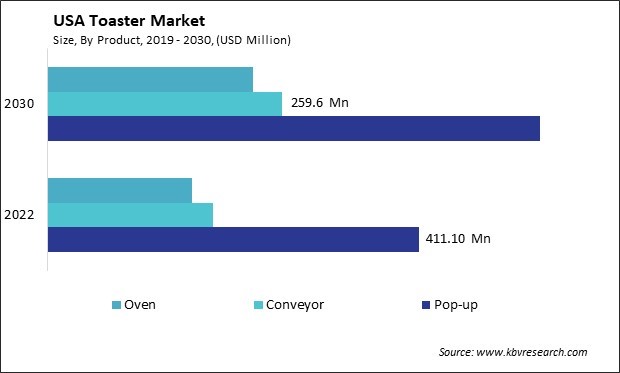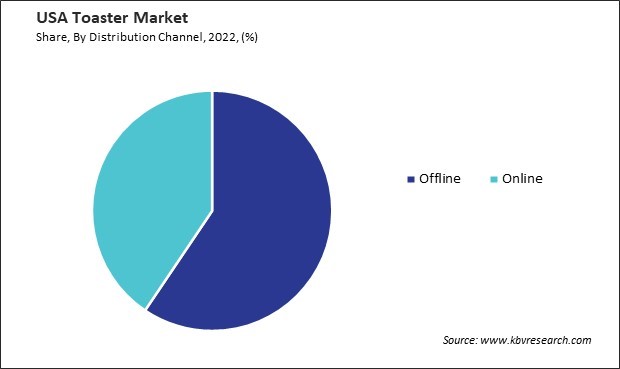Int'l : +1(646) 832-2886 | query@kbvresearch.com
Int'l : +1(646) 832-2886 | query@kbvresearch.com
Published Date : 22-Apr-2024 |
Pages: 81 |
Formats: PDF |
The USA Toaster Market size is expected to reach $1 Billion by 2030, rising at a market growth of 4.1% CAGR during the forecast period. In the year 2022, the market attained a volume of 7475.2 thousand units, experiencing a growth of 4.0% (2019-2022).
The toaster market in the United States has witnessed significant growth and evolution, becoming an integral part of modern kitchen appliances. Toasters are a staple in households nationwide, catering to the busy lifestyles of consumers who seek quick and convenient breakfast solutions. The COVID-19 pandemic has notably impacted consumer behavior and preferences, including in the kitchen appliance sector. With lockdowns and restrictions in place, more individuals found themselves cooking and preparing meals at home, leading to an uptick in the demand for kitchen appliances, including toasters. The convenience offered by toasters aligns with the trend of home-cooked meals becoming the norm during the pandemic.

One of the key drivers of the toaster market in the U.S. is the increasing focus on time-saving and efficient kitchen appliances. As consumers look for ways to streamline their morning routines, toasters provide a quick, hassle-free solution for toasting bread, bagels, and other breakfast items. The demand for versatile toasters that can handle different types of bread and offer customization options has also contributed to the industry’s growth.
According to the National Retail Federation, in 2018, the collective economic contribution of the 4.2 million retail establishments in the United States amounted to $3.9 trillion in GDP. Additionally, in 2019, the foreign direct investment (FDI) inflow into the U.S. retail sector reached $156.7 billion. When considering the toaster market in the U.S., these figures highlight the substantial economic impact of the broader retail industry, which encompasses various sectors, including appliances such as toasters.
The toaster market in the United States has experienced a notable expansion of commercial infrastructures, with hotels, restaurants, cafes, and schools playing a pivotal role in driving this growth. The demand for toasters in these establishments reflects a larger societal shift towards convenient and varied breakfast options and a desire for efficiency in food service operations.
Hotels across the U.S. have recognized the importance of providing a satisfying breakfast experience for their guests. As a result, high-performance toasters that can handle diverse bread types, bagels, and pastries have been adopted. Upscale hotels, in particular, invest in premium toasters equipped with advanced features to offer a superior breakfast service, contributing to overall guest satisfaction.
Restaurants and cafes, essential components of the vibrant U.S. food service industry, have also contributed significantly to the commercial infrastructures in the toaster market. With the rising popularity of artisanal bread and specialty pastries, these establishments require versatile toasting solutions. Commercial-grade toasters with customizable settings have become a staple in modern kitchens, enabling chefs to cater to the diverse tastes of their customers and maintain a competitive edge in the culinary landscape.
In educational institutions such as schools, the need for quick and efficient breakfast options for students and staff has led to increased investment in commercial toasters. Cafeterias are now equipped with toasting solutions that can handle high volumes, ensuring students can access warm and freshly toasted items. This reflects a broader trend in educational facilities prioritizing the overall dining experience and recognizing the role of breakfast in supporting student well-being. Thus, expanding commercial infrastructures, particularly in hotels, restaurants, cafes, and schools, has driven notable growth in the U.S. toaster market.
The toaster market in the United States has witnessed a unique shift in consumer behavior, influenced by the rising usage of social media platforms. As individuals increasingly turn to platforms such as Instagram, Pinterest, and TikTok to share their culinary creations, the toaster market has become a focal point for exchanging new and innovative food recipes.
Social media's pervasive influence on food culture has led to a burgeoning community of home cooks and food enthusiasts who regularly share their toaster-centric recipes. Whether experimenting with artisanal bread, exploring gluten-free options, or crafting delectable toppings, the U.S. population has embraced social media as a virtual kitchen to showcase their toasting skills.
Platforms like Instagram have become hotspots for food influencers and bloggers to share visually appealing images and videos of toast-based dishes, transforming the humble toaster into a tool for culinary creativity. The toaster market has responded to this trend by incorporating advanced features and designs that cater to the evolving needs of the social media-savvy consumer. Companies are now focusing on developing toasters with customizable settings, specialized toasting functions, and aesthetically pleasing designs that deliver exceptional performance and enhance the visual appeal of the toasting process for social media documentation. Therefore, the toaster market has become a hub for culinary innovation, driven by the pervasive influence of social media platforms like Instagram and TikTok in the U.S.

The toaster market in the United States is a dynamic and competitive industry driven by consumer preferences, technological advancements, and the demand for convenient breakfast solutions. One prominent player in the toaster market is KitchenAid. Known for its high-quality kitchen appliances, KitchenAid has established a strong presence in the United States. The company's toasters are renowned for their durability and performance. KitchenAid offers a variety of models, including two-slice and four-slice toasters, with features such as extra-wide slots for different types of bread and a range of browning settings.
Another major participant is Cuisinart, which has carved a niche in the industry with its innovative toaster designs. Cuisinart toasters often have advanced features like touchpad controls, countdown timers, and multiple toasting options. The brand caters to consumers looking for basic and high-end toasters, providing a diverse product line to meet various budget constraints.
Hamilton Beach is a well-known name in the toaster market, offering a wide range of affordable yet reliable toasters. The company focuses on delivering user-friendly appliances, and its toasters often include features like automatic shutoff and toast boost for easy removal of smaller slices. Hamilton Beach's commitment to affordability and functionality has contributed to its popularity among budget-conscious consumers.
Breville, an Australian-based company, has also made significant inroads into the U.S. toaster market. Breville toasters are celebrated for their sleek designs and cutting-edge technology. Many of their models feature smart toasting technology, which adjusts the toasting time based on the bread's thickness, ensuring consistent results. Breville's emphasis on innovation and aesthetics has garnered a dedicated customer base seeking premium toaster options.
Emerging players like Smeg have gained attention for their retro-inspired toaster designs in recent years. Smeg toasters combine a nostalgic aesthetic with modern functionality, making them popular among consumers who prioritize style and performance. The brand's commitment to unique design elements has allowed it to carve a niche in the competitive toaster market.
To address the growing demand for smart home appliances, companies like Balmuda have introduced technologically advanced toasters. Balmuda's toasters often feature smart sensors and precise temperature control, ensuring the perfect toast every time. These innovative offerings appeal to tech-savvy consumers looking for cutting-edge kitchen appliances.
By Product
By Distribution Channel
By Application